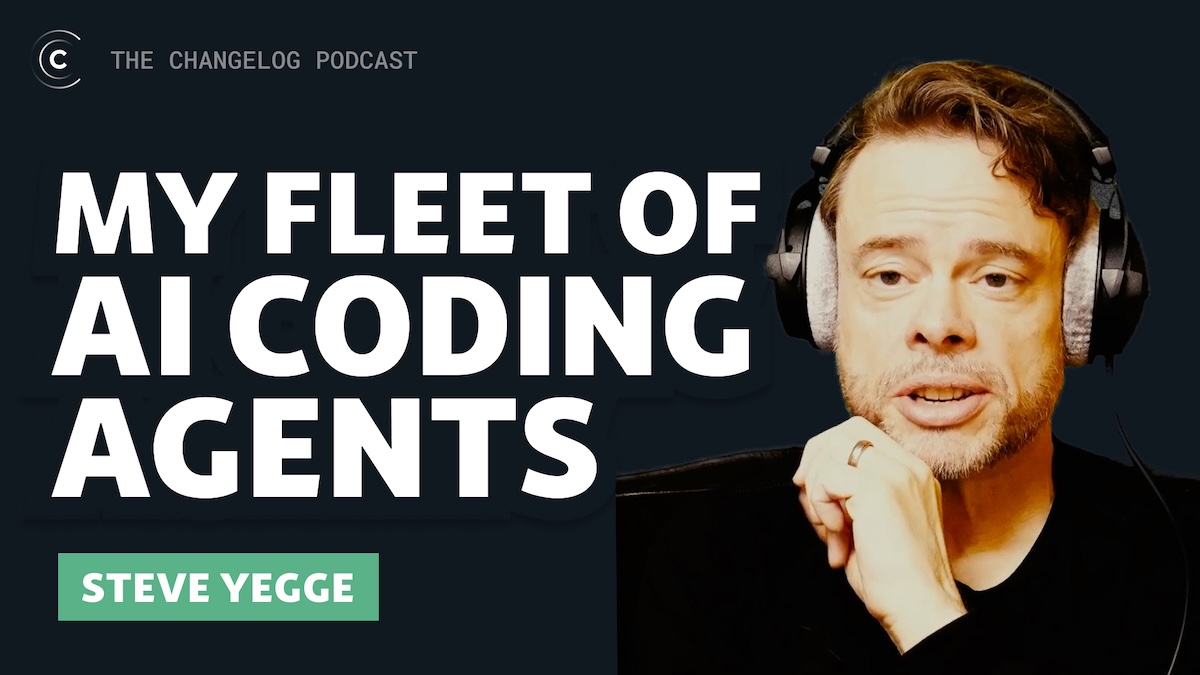Changelog News
Developer news worth your attention
Jerod here! 👋
Just days before their much-anticipated WWDC Keynote, Apple Research published a paper on the strengths and limitations of Large Reasoning Models which I can’t help but interpret as, “Seriously guys, there’s good reasons why our Apple Intelligence rollout has been a dumpster fire. You’ll see…”
Ok, let’s get into the news.
🎙️ Adventures in babysitting coding agents
The ever-provocative Steve Yegge joins us fresh off a vibe coding bender so productive, he wrote a book on the topic alongside award-winning author Gene Kim. Steve tells us why he believes the IDE is dead, why babysitting AI agents is more fun than coding, when vibe coding might take over the enterprise, how software devs should approach coding agents, and what it all means for society. 🎥 VIDEO
🙅♂️ Never. Let. AI. Write. Your. Tests.
Diwank’s “field guide to a new way of building software” starts off as a pretty typical “here’s how to be productive coding with AI”, but then he says something near the end (and emphatically so) that I haven’t heard anybody say:
Now we come to the most important principle in AI-assisted development. It’s so important that I’m going to repeat it in multiple ways until it’s burned into your memory:
Never. Let. AI. Write. Your. Tests.
Tests are not just code that verifies other code works. Tests are executable specifications. They encode your actual intentions, your edge cases, your understanding of the problem domain. High performers excel at both speed and stability—there’s no trade-off. Tests are how you achieve both.
Diwank says AI can help with test planning, suggest test scenarios, debug, analyze test failures, but that it should never touch test files, writes test code, or modify test expectations.
Your tests are your specification. They’re your safety net. They’re the encoded wisdom of every bug you’ve fixed and every edge case you’ve discovered. Guard them zealously.
I’m not sure if I agree or not. I don’t think I have enough experience yet to weigh in with more than a hunch. What do you think? Does this ring true to you or does it sound overly cautious?
Apple redesigns it all
The headliner announcement from Apple’s WWDC keynote was a complete redesign of all major software platforms:
Announced simultaneously for iOS, iPadOS, macOS, watchOS, tvOS, visionOS, and CarPlay, Liquid Glass forms a new universal design language for the first time. At its WWDC keynote address, Apple’s software chief Craig Federighi said “Apple Silicon has become dramatically more powerful enabling software, materials and experiences we once could only dream of.”
Inspired by visionOS, Liquid Glass is layered throughout the system and features rounded corners have been matched to the curved screens of the devices. It behaves just like glass in the real world and morphs when you need more options or move between views.
I’m not gonna lie. It’s giving me Windows Aero vibes. It’ll probably grow on me, but I can’t say I’m super excited about this change. The “return of texture, depth, and expressiveness in UI” trend I featured last week coming on the heels of Airbnb’s redesign is much more interesting…
👨⚖️ The rise of judgement over technical skill
Ever since ChatGPT launched our current AI madness, developers have been asking ourselves (and each other) what it all means in the long-term. We still don’t have the answer to that, but I can confidently say that at least in the medium-term it means we must move up the value chain, because the (once cherished) technical skills we’ve acquired are being commoditized at a blistering pace. There’s nothing new under the sun:
In 1995, musician and producer Brian Eno made a profound observation about computer sequencers that has become increasingly relevant in our AI-powered world:
“The great benefit of computer sequencers is that they remove the issue of skill, and replace it with the issue of judgement. With Cubase or Photoshop, anybody can actually do anything, and you can make stuff that sounds very much like stuff you’d hear on the radio, or looks very much like anything you see in magazines. So the question becomes not whether you can do it or not, because any drudge can do it if they’re prepared to sit in front of the computer for a few days, the question then is, ‘Of all the things you can now do, which do you choose to do?’”
Adam and I had a similar conversation about digital photography while on a photowalk in NYC years ago. It was my contention that the skills required to take great pictures were trending to zero and when we get to that point (we’re pretty close now) the only thing that would matter is taste, which is just another form of judgement. In other words, it’s a way of answering the question, ‘Of all the perspectives you can now capture, which do you choose to capture?’
In one sense, this newsletter is me trying to climb my way up the value chain. Sure, I write some prose too. But not notably well. What I really do is repeatedly answer the question, ‘Of all the things you can feature, which do you choose to feature?’
💰 Our best customers are now robots
Thanks to Fly.io for sponsoring Changelog News
Kurt Mackey and our friends at Fly have had quite the experience over the last 6 months:
But a funny thing has happened over the last 6 months or so. If you look at the numbers, DX might not matter that much. That’s because the users driving the most growth on the platform aren’t people at all. They’re… robots.
We’ve talked about LLM SEO a few times on the pod, and this is why. Why attract humans when coding agents make tool selections at massive scale? Kurt and his team are now focusing on the latter:
“If you try to think like a robot, you can predict other things they might want. Since robot money spends just the same as people money, I guess we ought to start doing that.
For instance: it should be easy to MCP our API. The robots can then make their own infrastructure decisions.”
Lots to glean from this! Thanks to Fly.io for sharing so candidly (and sponsoring Changelog News)!
💻 Claude Code is my computer
Peter Steinberger:
I run Claude Code in no-prompt mode; it saves me an hour a day and hasn’t broken my Mac in two months. The $200/month Max plan pays for itself.
This echoes the sentiment that Steve Yegge impressed upon us on last week’s show. After recording that, I took Steve’s advice and gave Claude Code the ol’ college try at writing a few scripts I’d procrastinated because they were just too much work for their perceived ROI. Color me impressed. The first script Claude wrote was delivered so well on my specs that I decided to vibe code the second one (didn’t even look the code). Peter says this about Claude Code:
Claude Code shines because it was built command-line-first, not bolted onto an IDE as an afterthought. The agent has full access to my filesystem (if you are bold enough…), can execute commands, read output, and iterate based on results.
I think that’s right. I like this more than I like Claude inside Zed. It’s even more natural in my terminal than it is in my editor, for some reason. More to come on this front, but yeah. Up the value chain we go…
🙃 The curious case of Memvid
Ok I’m feeling way too AI bullish in this issue, so here’s a nice balancing story. A graduate student created a software project that got a LOT of attention online. Its pitch:
Memvid revolutionizes AI memory management by encoding text data into videos, enabling lightning-fast semantic search across millions of text chunks with sub-second retrieval times. Unlike traditional vector databases that consume massive amounts of RAM and storage, Memvid compresses your knowledge base into compact video files while maintaining instant access to any piece of information.
That sounds amazing. But it also sounds… weird? Why would encoding text into video use less disk space or make anything faster? Turns out it doesn’t:
Testing shows this library’s performance is opposite of what the README claims… Your text will take 100x more disk space… Searches will be 5x slower… Setup will take hours, not minutes… This library will cause serious problems at production scale. The README’s performance claims are backwards.
On the heels of this discovery came a new contribution.. a proposal for Memvid 1.0 – The Universal, Streamable, Self-Contained AI Memory Format. Does that sound ambitious? Does it sound… sloppy?! One commenter sure thinks so:
GitHub is now infested with AI slop. AI generated repo with obvious overhead and no practical usages, people that has AI-replaced brains giving star to this, and AI generated issue. Perfect.
The AI slopping will continue until morale improves…
🎧 We’re all Builders now
We’re on location at MSBuild 2025 with Amanda Silver, Corporate Vice President of Microsoft’s Developer Division. We discuss the latest AI announcements from Microsoft at Build 2025, how AI is reshaping development tools, what’s next for VS Code, TypeScript, GitHub’s evolution, and even emerging editors like Windsurf that are forking VS Code. 🎥 VIDEO
🔎 The HTTP QUERY Method
A new HTTP method is in the works. QUERY will be a safe, idempotent request method that can carry request content. It’s like a middle ground between GET and POST, built specifically for search uses:
As with POST, the input to the query operation is passed as the content of the request rather than as part of the request URI. Unlike POST, however, the method is explicitly safe and idempotent, allowing functions like caching and automatic retries to operate.
I prefer GET to POST on search endpoints because you can easily share the search by copy/pasting the URL, but GET isn’t without its drawbacks. It’s nice to see the HTTP Working Group making progress on stuff like this.
🫙 Containerized environments for coding agents
A new safety/isolation tool From the fine folks at Dagger:
“Container Use” lets each of your coding agents have their own containerized environment. Go from babysitting one agent at a time to enabling multiple agents to work safely and independently with your preferred stack.
It’s an open-source MCP server that works as a CLI tool with Claude Code, Cursor, and other MCP-compatible agents.
🪐 Markdown with superpowers
Quarkdown is a modern Markdown-based typesetting system, designed around the key concept of versatility, by seamlessly compiling a project into a print-ready book or an interactive presentation. All through an incredibly powerful Turing-complete extension of Markdown, ensuring your ideas flow automatically into paper.
📐 Don’t forget your (un)ordered list
- When to Leave
- Machine code isn’t scary
- Ephemeral Markdown Paper
- IRS Direct File now on GitHub
- My AI skeptic friends are all nuts
- A tool for enhancing Claude Code
- The 2025 Apple Design Award winners
- Memory for AI Agents in 5 lines of code
- Jacob Kaplan-Moss is leaving the tech industry
- Why open source maintainers thrive in the LLM era
- A CLI thats scans/reports on common HTML i18n issues
- Over 4 billion user records leaked in “largest breach ever”
- The last six months in LLMs, illustrated by pelicans on bicycles
- The founder of DeviantArt is making a $22k display for digital art
That’s the news for now, but we have some great episodes coming up this week:
- Wednesday: Richard Feldman tells me all about Roc
- Friday: Justin Searls on Apple’s WWDC announcements
Have a great week, pay this forward if you liked it, and I’ll talk to you again real soon. 💚
–Jerod

